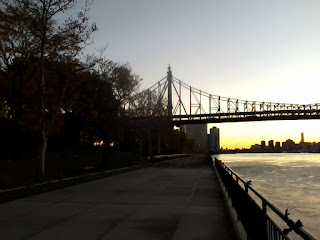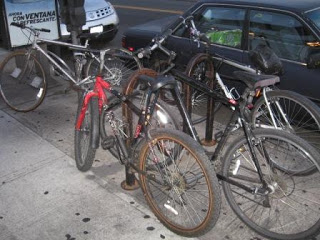On a Montreal street, I saw a sign like this:
In French, “foot” is “pied”. Apparently, the same translation is made when
“foot” refers to the unit of measure rather than the bodily appendage.
Such a sign is not remarkable until you realize that
Quebec, like the rest of Canada and the world, uses the metric system. Thus, that speed limit sign that reads
“50”—in kilometers per hour, of course-- translates into a speed limit of about
30 miles per hour. Likewise, those one-pound packages of pasta, chips or other
food become 500 kilograms (about 17.5 ounces, or one pound and 1.5 ounces) and
gasoline, beer and milk are sold by the liter rather than the gallon, quart or
pint.
That “pied carre” sign is oddly reflective of the
standards (if they might be called that) in bicycle measurements. Until the 1980s, British bikes, as well as
most Japanese and high-quality American bikes, used British standard
measurements for everything from bottom bracket threads to frame sizes. Often, the metric equivalents were provided
along with their Imperial counterparts.
So, for example, a one-inch steerer tube would also be marked as 25.4
mm.
The other main standards of bicycle measurements
were Italian, which is still (mostly) in use and French, which was found on
most continental European bikes not make in Italy. Both standards were metric, although some of
the Italian measurements (such as bottom bracket and steerer tube sizes) were
metric “translations”, if you will, from Imperial sizes. I can find no explanation of why they were
so; I am guessing that they were leftovers from the days when Italian racers,
like their counterparts in other European countries, were using BSA components.
Only the French system of threading and measurement
was completely metric. The handlebar stem quill (the part that inserts into the
fork) diameter was 22.0 mm; the British and Italians used 22.2 mm, which is
7/8”. Most American bikes and some Japanese bikes exported the US took 5/6”
diameter, which the Japanese usually listed as .833” and is today known as 21.1
mm. My Schwinn LeTour, made by Panasonic
in Japan, uses that size. So did my old Nishiki International.
At one time, it was commonly believed that if the worldwide bicycle industry were to adopt a single set of standards, it would be the French system, as it was the most consistent and because almost every country besides the US was using the metric system for everything. But, because of the influence the American bicycle market came to exert over that of the rest of the world, the ISO standards became a veritable mishmash of metric and inch measurements. Bottom brackets are 1.37 (or 1-3/8) inches by 24 threads per inch and headsets are 1 or 1-1/8 inches. (A few tandems and early downhill mountain bikes are 1-1/4.) On the other hand, everything from seat post diameters to axle lengths are expressed in millimeters.
Perhaps the most bizarre aspect of bicycle
measurements comes in frame sizing.
British and American frames-- even customs and Paramounts—and Japanese
bikes made for export up to 1980 or so were built with inch sizing. So, my International was 23 inches; the next
size down was 21 and the next-largest size was 25. My Romic and first Trek were 22 inches; my subsequent road bikes had 55 or 56
cm frames.
Now almost all road bikes have frames measured in
centimeters. However, most mountain bike
frames are, and have been, marketed (at least in the US) with inch
measurements. So, while my Bontrager
Race Lite had an 18-inch frame, the Land Shark road bike I would get a few
months later was 55cm.
A certain cartoon exhorted its viewers to “BlameCanada!” Hmm…Could our neighbors to the
north be the reason behind our schizophrenic system of measurements? Then again, “pied square” I saw was the only
instance of Imperial measurements I saw in Montreal. (You won’t find it in
Paris, or anywhere else in Europe.) And
it was used only in reference to real estate.
I wonder why that is.






























